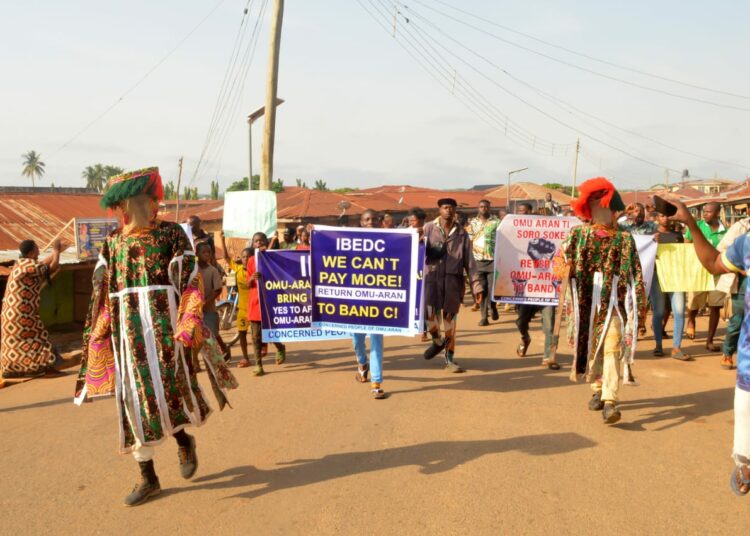The tranquil town of Omu-Aran, nestled in Kwara State, Nigeria, erupted in vibrant protest as youths took to the streets, their voices unified against what they perceived as an unjust hike in electricity tariffs. Donning colorful masquerades, a symbolic representation of their cultural heritage and collective strength, the young demonstrators marched through the town, their placards bearing poignant messages of discontent: “Omu-Aran Says No to Band A,” “Bring Us Back to Band C,” and “Omu-Aran Youths Have Spoken Loudly.” The core of their grievance stemmed from the sudden and unexplained shift in the town’s electricity billing regime from Band C to Band A, resulting in a significant surge in electricity bills for the month of March 2025. The increase, they argued, was not only exorbitant but also unjustified, given the persistent challenges plaguing the community’s electricity supply. The protest, a vibrant display of collective action, painted a stark picture of the community’s struggle against what they considered unfair practices by the Ibadan Electricity Distribution Company (IBEDC).
The youths’ frustration was palpable, fueled by the perceived disconnect between the escalating electricity bills and the unreliable power supply. They argued that the IBEDC had implemented the tariff hike without addressing the pre-existing issues of faulty transformers and inconsistent electricity supply in several parts of the community. Their anger was further exacerbated by the perceived insensitivity of the IBEDC to their plight. The electricity bills for March 2025, ranging from N41,000 to N47,000, were a stark contrast to the previous range of N10,000 to N15,000 under Band C. This sharp increase placed an undue burden on the residents, many of whom were already struggling with economic hardships. The protest, therefore, was not merely about the increased tariffs but also about the perceived disregard for their well-being by the electricity distribution company.
The protest, which began at Bareke Roundabout, quickly gained momentum, transforming into a powerful display of community solidarity. The youths, energized by their shared purpose, marched through major streets, including Olomu Market, Latinwo Market Area, and the Olomu palace, their chants echoing their demands for justice. Their procession culminated at the IBEDC District office located within the Omu-Aran City Complex, a symbolic act of bringing their grievances directly to the doorstep of the company they held responsible for their plight. Declining police escort, the youths demonstrated their autonomy and determination to have their voices heard without external influence. The blockades on major highways, including the Omu-Aran-Kabba Highway and Omu-Aran-Otun-Ekiti Highway, further underscored their resolve, disrupting inter-state travel and highlighting the magnitude of their discontent.
At the heart of the youths’ demands was a call for fairness and accountability. They insisted on the reversion of the billing regime from Band A back to Band C, demanding a review of the current charges to reflect the previous, more affordable rates. Beyond the tariff issue, they also pressed for immediate action to address the underlying problems plaguing the electricity supply. Their demands, articulated in a statement signed by Niyi Adeyeye, President of the Omu-Aran Development Association, included the replacement of faulty transformers, a critical step towards ensuring a stable and reliable power supply. Furthermore, they demanded an independent review of IBEDC’s service delivery in Omu-Aran to assess the justification for the tariff classification. Their list of grievances also included the cessation of overdraft purchases on pre-paid meters and an end to the practice of consumers having to purchase materials for faulty electricity equipment, practices they perceived as exploitative and unfair.
The intervention of Oba Abdulraheem Adeoti, the Olomu of Omu-Aran, injected a note of calm into the charged atmosphere. Addressing the protesters at his palace, the traditional ruler appealed for restraint, assuring them that community leaders were actively engaging with IBEDC officials to find a resolution to the issues. His call for patience, while acknowledging the legitimacy of the youths’ concerns, aimed to de-escalate the situation and pave the way for dialogue. The Olomu’s intervention underscored the important role of traditional leadership in conflict resolution within the community. His presence and words of wisdom served as a stabilizing influence, reaffirming the community’s commitment to finding a peaceful and equitable solution to the crisis.
The Omu-Aran electricity tariff protest serves as a microcosm of the broader challenges facing many communities in Nigeria regarding access to reliable and affordable electricity. The youths’ demonstration underscored the importance of community engagement and the power of collective action in holding service providers accountable. The protest also highlighted the crucial role of traditional leaders in mediating disputes and fostering dialogue between communities and service providers. While the immediate outcome of the protest remained uncertain, the youths’ actions had undoubtedly amplified their voices, placing their concerns firmly on the agenda of both the IBEDC and the community leadership. The incident serves as a potent reminder of the ongoing struggle for equitable access to essential services in many parts of Nigeria and the importance of community mobilization in demanding accountability and fairness.














